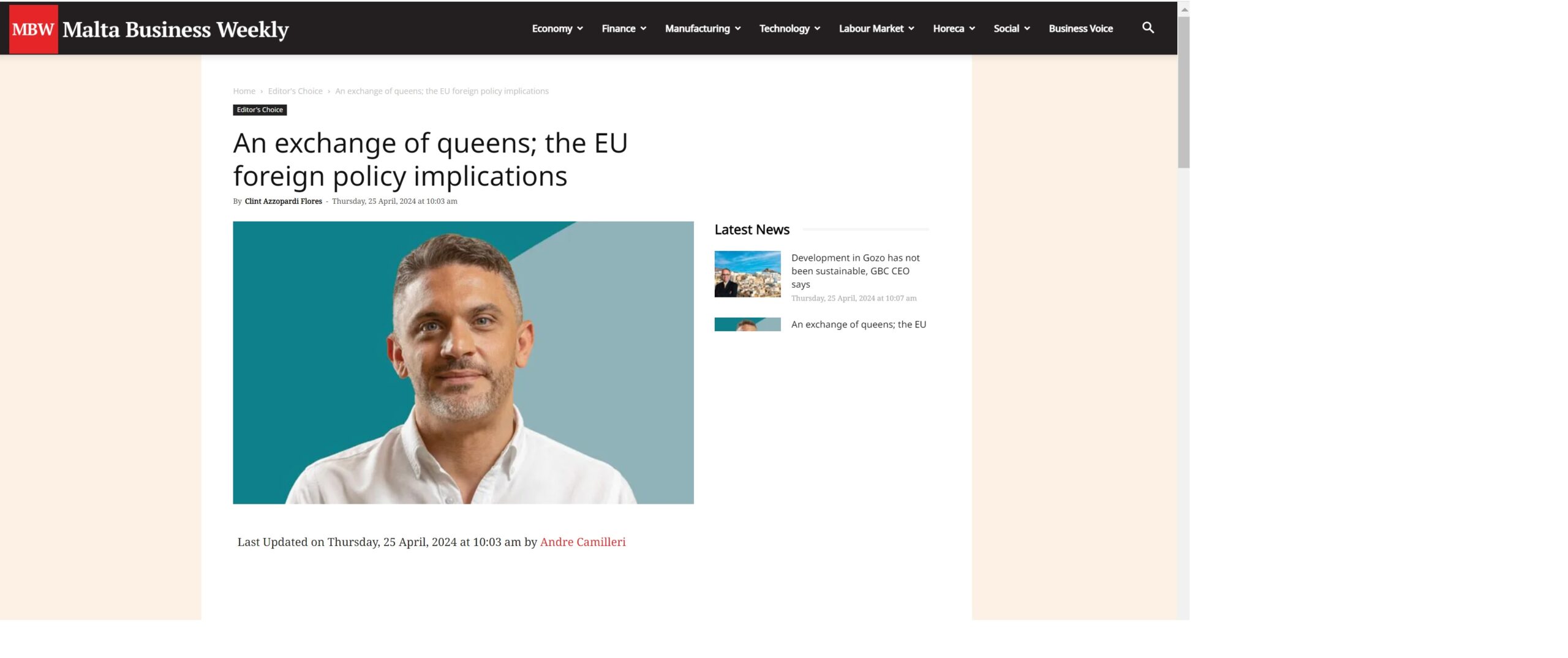A study commissioned by the Malta Hotels and Restaurants Association (MHRA) revealed that when considering the current bed stock, Malta requires around 4,700,000 arrivals and an accompanying booking of an average of roughly seven nights per tourist to reach an occupancy rate of 80% throughout the year.
Environmentalists might argue that the figure is astronomical for the smallness of the country and its infrastructure cannot sustain the quoted figures. On the other hand, neoliberal economists might argue that the market is always rational and the number of hotels required in the country must be left to be decided by the invisible hand and the laws of demand and supply. However, sustainability advocates, who sit somewhere in between profits and the protection of the environment, will argue that climate and environmental risks must be factored in when deciding about the future market patterns of an economy.
However, it must be outlined that the European Union is pushing for the implementation of the Green Deal, and that requires member states to start transiting to greener investments by also embarking on a clear path to decarbonise their economies. Nevertheless, to decarbonise an economy, authorities must understand the material exposures of its lead economic industries. This level of granularity is crucial to start benchmarking and understanding the materiality of the industries and the corresponding sectorial economic exposures. Like other sectors, the future sustainability of the tourism industry is relying on the green measures that will be taken to protect the industry.
Certainly, sustainable investment proposals in the accommodation sector are becoming more compelling to financial undertakings in Europe. Furthermore, the MHRA’s report states that the 2019 figures of tourist arrivals were already exerting pressure on crucial limiting factors that affect the tourism experience offered in Malta; not to mention the effects on the standard of living of permanent residents. Also, the report mentions that Malta’s limiting factors are under pressure including the broader infrastructure. Clearly, Maltese policymakers must decide the number of tourists that the country’s infrastructure ought to sustain and the economy’s material exposure attached to this important sector.
There are several climate-related reports on the table. Indeed, the UN reports exposes the climate and environmental risks of the southern Mediterranean countries. Some of these risks relate to heat stress and water stress. This means that additional incremental figures in the number of tourists, clearly necessitates extra water production and storage to sustain the corresponding permanent and visiting population. Besides, Malta is experiencing a shortage of labour and additional importation of third country nationals to serve the construction industry, and the retail sector, requires extra investments to store water. Equally, if Malta is bound to experience frequent occurrences of heat stress, similarly, the construction industry is going to be affected due to lower labour productivity. Hence, building additional hotels to maintain bigger numbers, would require additional importation of workers to compensate for the reduction in the labour productivity emanating from heat stress.
As one expects, the topic is complex, and we cannot just take the industry in isolation without including additional important factors in the equation. In our rudimentary economic lectures, we learned to base our assumptions on the notion of “other things being equal” or better put ceteris paribus. However, if other thing being equal falls, then the assumption of the model fails. In the past, we could have omitted the climate and environmental risk factors from the economic equation, as it was not politically on the international agenda.
However, we cannot defy the laws of science, anymore. If the UN’s reports including the IPCC reports, are sounding the alarm that some sectors are at a higher risk, including the accommodation sector, then we cannot leave the market to decide the number of hotels.
Unquestionably, the EU is pushing to democratise the financial system and any future accessibility to credit will be easier for those embedding sustainability risks in their investment projects. Surely, we can defy the law of demand and supply by expediting private investment to expand the economy in a relatively short period of time. However, sustainability advocates would rightly contend on the long-term sustainability of such private investments, as it would leave future generations exposed to greater risks. If the MHRA report is stating that the sewage networks are operating at a maximum capacity in some tourist zones in Malta, then exerting additional strain on the ecosystem is not advisable. Obviously, the notion of the preservation of natural capital must be taken seriously. Also, authorities must assure that the expansionism of hotel accommodation must be strictly used for tourism and not sold as private real estate on the market.
Normally, when a market fails the government steps in to correct it; this is not regarded as interfering with a market economy. Au contraire, the correction of the market failure augurs a better functioning of the market and a better product to our tourist arrivals. Certainly, a planned economy is not on the government’s agenda. It is not even allowed under EU law. However, protecting those effected by overdevelopment, including the tourists that visit the smallness of our island is crucial, otherwise we are going to lose our uniqueness, as well as our cultural heritage.
Neoliberalists might argue that due to the smallness of the island it is easy to create oligopolistic markets in Malta if competitive hotel accommodation development is restricted. However, there are already safeguards in place to cater for such abuses under the competition law. Another way to defy such market abuses is to allow further relaxation of the usage of proper and adequate private accommodation in case of suspected tacit collusion. Rationally, if in theory an oligopolistic market is created by not allowing further hotel accommodation development, then those believing in the market ought to consider that one of the risks associated with price collusion is no market at all in such a highly competitive industry. This is not the fixed broadband or telephony sector. Therefore, prices would need to go down to attract additional tourists, otherwise they are automatically pushed out of the market. Oligopolies do not enjoy super normal profits unlike monopolies and therefore they must carefully watch the prices they charge.
We must bear in mind that the world is changing. The geopolitical reality around us is also altering consumption patterns and the way we behave. People are becoming more aware of the risks associated with climate change and the harmful effects on the environment. Correspondingly, contentment is not about GDP figures but about the wellbeing of citizens, including a better environment and a sustainable economy. If we insist on the obsession of benchmarking welfare just by quoting positive GDP figures and completely omit sustainability we risk losing on innovating. And please do consider other factors under the ceteris paribus theory, especially when deciding on the future supply of our hotel accommodation.



